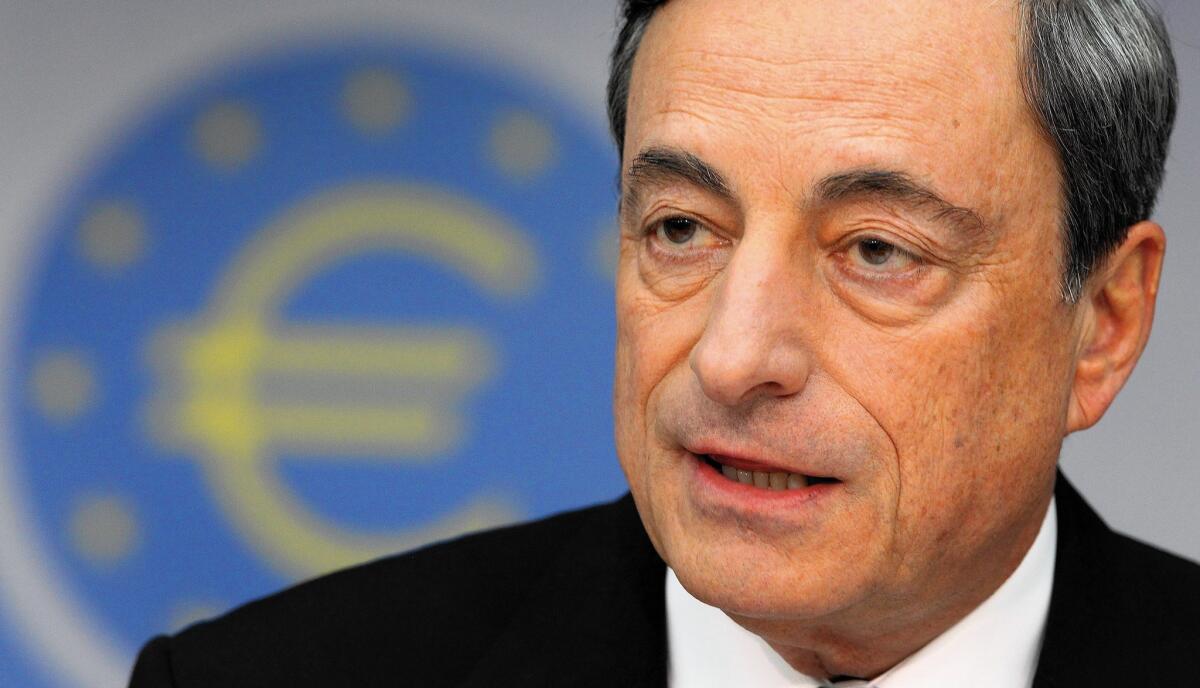European Central Bank expected to unveil stimulus plan

- Share via
Reporting from new york — In the summer of 2012, with the euro in crisis and the European experiment of unified government seemingly on the brink, the head of the European Central Bank made a now-famous vow.
“The ECB will do whatever it takes to preserve the euro,” Mario Draghi said. “And believe me, it will be enough.”
On Thursday, global markets will be watching to see whether Draghi will back that promise with a mountain of cash.
The ECB, the equivalent of the U.S. Federal Reserve, controls monetary policy for the 19-member Eurozone economy. The bank is widely expected to embark on a U.S.-style plan of monetary stimulus designed to prevent the continent from sliding into recession or, worse, deflation.
The ECB’s Governing Council is expected to take the unusual and risky step of printing money to buy bonds on a massive scale, including the sovereign debt of struggling nations like Spain, Italy and recession-plagued Greece. The goal is to inject cash into those countries to stimulate the regional economy.
For Americans, implications of decisions by central bankers in Frankfurt, Germany, are modest in the short run but potentially profound.
Although the U.S. economy is shifting into high gear, it remains vulnerable to a downturn in the European Union — the fourth-largest U.S. trading partner. Meanwhile, growth in the rest of the world is faltering, and some analysts warn that the U.S. can’t long remain an island of prosperity if a global slowdown takes hold.
“There’s the possibility of this deflationary spiral,” said Petr Zemcik, director of European economics for Moody’s Analytics.
European stock markets have been edging up this week, while the interest rates on debt offered by Germany, Italy, Spain and other European states have been edging down on speculation of a central bank stimulus.
Indeed, analysts expect market turmoil if the ECB fails to act, or even if it offers a program perceived as too small.
“If this didn’t happen, I’d be writing my column from underneath my desk,” joked Bob Johnson, director of economic analysis for mutual fund research firm Morningstar Inc.
Apart from Europe, China poses another worry after a report this week that its growth slowed to 7.4% last year, the lowest rate in more than a decade. Further, Japan slipped into recession in the third quarter, even as its government applies shock therapy to the long-stalled economy with a combination of deregulation and monetary stimulus.
Japan’s long-running economic malaise exemplifies the threat posed by a deflationary trap, analysts warn.
“That kind downward spiral is what’s at stake for the euro area,” said Antonio Garcia Pascual, chief euro-area economist for Barclays’ investment bank.
Europe, which has struggled economically since the 2008 financial crisis, has recently seen another slowdown. Forecasters anticipate just 1.2% growth this year.
Ominously, inflation for the area dipped into negative territory, -0.2%, in December, and forecasts call for it to stay negative for 2015.
The prospect of deflation and a further weakening of the euro last week prompted the Swiss central bank to announce it would abandon efforts to keep a ceiling on the Swiss franc of 1.2 francs to the euro.
The news, which caused the franc to jump and the euro to slump further, may have strengthened Draghi’s hand in pushing for stimulus.
Fending off deflation may be the ultimate test for Draghi as ECB president. A former academic economist trained at MIT, Draghi has spent the last two decades honing his political skills as the head of Italy’s central bank and within international and European financial bureaucracies.
Since taking over the ECB in 2011, he has clashed repeatedly with the leaders of the Eurozone’s largest economy, Germany, and particularly with that country’s powerful central bank, the Bundesbank. The German institution is guided by memories of disastrous hyperinflation in the Weimar Republic in the 1920s and the country’s postwar revival under a strong, stable deutsche mark.
Besides opposing bond-buying as inflationary, Bundesbank officials have argued that the Eurozone’s problems stem from the flawed national economies of its weaker southern members — and that ECB support would only delay needed structural reforms there.
Draghi is widely expected to push through a stimulus plan over German objections. The main question is how much money he will put behind the effort.
A recent survey of 176 traders by the French bank Societe Generale found that 70% expected a bond-buying program to be announced at the ECB meeting Thursday. Most of those surveyed expected the program to be about 500 million euros; others predict a larger stimulus.
In a recent report, Goldman Sachs forecast the upper end of a possible ECB program of 1 trillion euros. If spaced over two years, as expected, that would be only a slightly slower pace on a monthly basis than the U.S. Federal Reserve’s recently ended bond-buying program.
Draghi’s clashes with his German counterparts have thus far been mostly rhetorical. While the ECB formally is independent from its member states, the reality has been far different.
“Until now,” Zemcik of Moody’s said, “Germany got its way.”
But most analysts believe Draghi has the votes on the 25-member Governing Council to override German objections. He is scheduled to announce the ECB’s decision on Thursday at 5:30 a.m. Pacific time.
More to Read
Inside the business of entertainment
The Wide Shot brings you news, analysis and insights on everything from streaming wars to production — and what it all means for the future.
You may occasionally receive promotional content from the Los Angeles Times.











